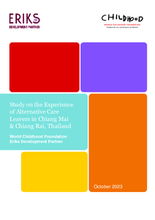The purpose of this study is to explore how growing up in private residential care in Chiang Mai and Chiang Rai provinces of Thailand has affected children’s well-being over time. The research provided an important opportunity for young people to describe and analyze their experience, as well as make their own conclusions and recommendations. Understanding the life paths of these young people after leaving care offers important insights for developing strategies, policies and services to improve outcomes for other children facing similar experiences. The study was commissioned as part of the project “Out of the Ashes into the Fire”, implemented by the World Childhood Foundation and Eriks development partner, with an overall goal to prevent the unnecessary separation of children from their families and contribute to an overall reduction of the use and demand for residential care.
Study Objectives:
- To contribute to understanding of how placement in private residential care in Thailand affects children’s wellbeing and experience of violence in the long term after leaving care.
- To better understand the effects of residential care and how this is related to child growth and development, as well as experiences of violence and exploitation.
- To understand the types of relationships that children form in care in Thailand with caregivers, other adults and peers and how these relationships impact their wellbeing
- To collect information on the wellbeing of children and youth after they leave private residential care and identify any visible trends or patterns
- To reaffirm the rights of all children to free expression and to have their views taken into account by elevating their experiences and voices.
Study Scope:
The study scope was defined by three primary factors: time frame of interest, type of residential care to be included in the study and the target location:
- Target Group: youth who have left residential care in the last 5-10 years and were residents for at least one year.
- Type of residential care: private institutions which either have a religious affiliation and/ or regularly receive volunteers, including both unregistered and registered residential care facilities with limited government control / supervision.
- Location: NGO / FBO privately run and funded residential care facilities based in Chiang Mai and Chiang Rai provinces, where previous research indicates that the majority of these facilities are located.
The study employed a mixed methods approach which included both quantitative and qualitative components. This study does not intend to be representative of the overall care leavers population in Thailand who have experience living in private residential care, but rather aimed to establish a more in depth understanding of the experiences, perceptions and impact of growing up in private residential care on their lives. Interviews were conducted with 22 care leavers, 22 service providers, 8 parents, 4 government representatives, and an online survey with 75 care leavers. The findings were validated with stakeholder members of the Reference Group and presented to a group of care leavers in Chiang Mai.
Also see:

